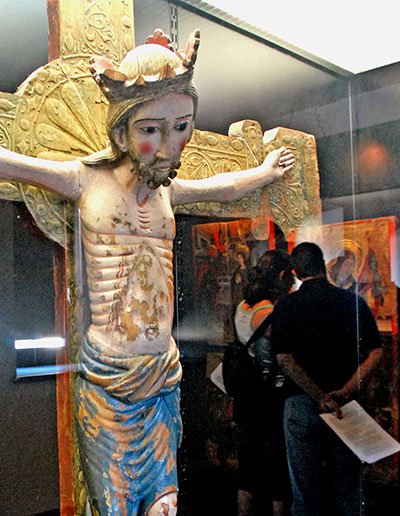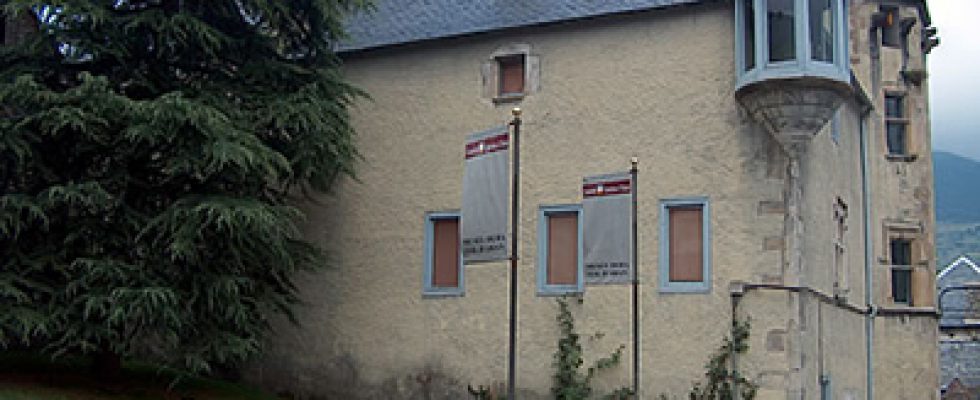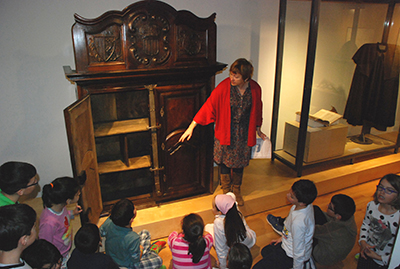 Definitely a “must see” for the traveller who wants to know the Aran land and its people, history and culture, the language and its particular identity. Located on the Tor deth Generau Martinhon, a manor house in Vielha from the seventeenth century, the permanent exhibition of the Museu dera Val d’Aran is served by an extensive collection of archaeological, artistic and ethnographic objects to tell the historical evolution that leads to today Val d’Aran.
Definitely a “must see” for the traveller who wants to know the Aran land and its people, history and culture, the language and its particular identity. Located on the Tor deth Generau Martinhon, a manor house in Vielha from the seventeenth century, the permanent exhibition of the Museu dera Val d’Aran is served by an extensive collection of archaeological, artistic and ethnographic objects to tell the historical evolution that leads to today Val d’Aran.
To understand this important heritage, the museum not only displays objects, but also explains them actively with the help of the visitor, who becomes actor and spectator at the same time. Thus, it offers three levels of reading: the simple exposure through the image; a second level with texts and audio-visuals; and greater depth using the exhibition guide, catalogues and other materials. Aranese has a predominant role, but currently all texts are translated into Catalan and Castilian.
Areas and remarkable pieces
 The museum takes a journey through the history of the Val d’Aran from the Stone Age to the early modern times, divided into different areas: the cradle of the Garonne, the conquest of the mountain and the first evidence of human presence in l’Aran; Romanization; the fortifications and defence of the border because of its geostrategic position; the development of agriculture and livestock to the industrial age time of mines and hydroelectric plants and the path to the present day, stopping at the festive and cultural traditions of the Aran people.
The museum takes a journey through the history of the Val d’Aran from the Stone Age to the early modern times, divided into different areas: the cradle of the Garonne, the conquest of the mountain and the first evidence of human presence in l’Aran; Romanization; the fortifications and defence of the border because of its geostrategic position; the development of agriculture and livestock to the industrial age time of mines and hydroelectric plants and the path to the present day, stopping at the festive and cultural traditions of the Aran people.
Throughout the different floors visitors will discover artistic and archaeological items of great value as the Crist d’Escunhau or the Crist de Casarilh or a series of ancient pottery vessels. On the third floor is the Wardrobe of Privileges or des Sies Claus, guarding the Conselh Generau of the Val d’Aran documents, including the Val d’Aran Carta Magna: Era Querimònia.
Activities for younger
With the help of Pedagògics Resource Centre of the Val d’Aran, there are also designed spaces and activities for children to do more entertaining and understandable the visit. So, the little ones can enjoy a game of clues and evidence, knowing the amusing anecdotes hidden in the closet of six keys and surprised by recreating the Victoria mines. In addition, some notebooks accompany these activities, the talhèrs deth MdVA, which present the museum to the youngest from the viewpoint of an historian or an archaeologist, or on the trail of a lizard.
On the other hand, from the Museu dera Val d’Aran, it has developed a network of heritage equipment adorning the Aranese territory where, through exhibitions or the different materials, and activities that had been developed during the year, visitors are encouraged to learn and discover the life and social transformations of this mountain territory.
Building
The Tor deth Generau Martinhon, where the museum is located, is a fortification from the early seventeenth century, representative of the Aran architecture of this period. On the main facade highlight the wide door lintel topped by a coat of arms and the windows decorated with moldings and Renaissance style overalls. There is also a octagonal tower that gives its name to the building. Another outstanding feature in construction is the gazebo, whose current appearance is the result of a restoration of 1983.
The building, of late Gothic style was classified as a Cultural Asset of National Interest in 1949. Despite its name, Martinhon general, and the defence elements posing on the facades, it has not been linked to any particular war episode. Miquel Farré i Albagés owner in 1974, ceded it to host the Museu dera Val d’Aran.










